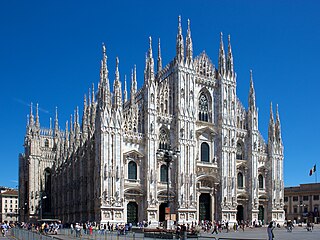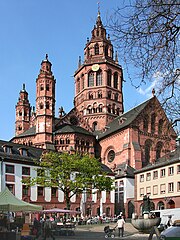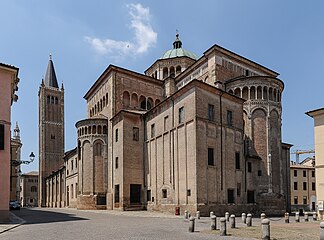Duomo
This article needs additional citations for verification. (December 2009) |

Duomo (English:
Locally, people usually use il Duomo, the Duomo, without regard to the full proper name of the church.
Similar words exist in other European languages: Dom (German and Dutch), dom (Romanian), dóm (Hungarian and Slovak), dôme (French - usually less common), domo (Portuguese), doms (Latvian), tum (Polish), domkirke (Danish and Norwegian), dómkirkja (Icelandic), domkyrka (Swedish), toomkirik (Estonian), tuomiokirkko (Finnish) and so on. Also in these languages the respective terms do not necessarily refer to a church functioning as a cathedral, but also to proto-cathedrals or simply prominent church buildings, which have never been a cathedral in the exact sense of that word. German Dom and Polish tum became the synecdoche used – pars pro toto – for most existing or former collegiate churches. Therefore, translation of these terms into English as "cathedrals" may not always be appropriate and should be used on a contextual basis. Generally, only the Italian duomo and the German Dom are likely to be encountered in English.
According to the Oxford English Dictionary and the Zingarelli, the word duomo derives from the Latin word domus, meaning "house", as a cathedral is the "house of God", or domus Dei. The Garzanti online dictionary also gives the etymology as deriving from "house", but "house of the bishop"[2] instead.
Italian cathedrals are often highly decorated and contain notable artworks; in many cases the buildings themselves are true artworks. Perhaps the best known duomo is the one in Florence, but other well-known cathedrals include the Milan Cathedral and those of Siena, Alba, Ancona, Mantua and Parma. [citation needed]
Gallery
-
Cathedral of Saint Sava, Serbia
See also
References
- ^ Giacomo Devoto, Gian Carlo Oli, Il Devoto–Oli. Vocabolario della Lingua Italiana, edited by Luca Serianni and Maurizio Trifone, Le Monnier.
- ^ "duomo". Garzantilinguistica.it. Archived from the original on 2012-07-31. Retrieved 2018-07-02.
domu(m) (episcopi); propr. 'casa (del vescovo)'.














